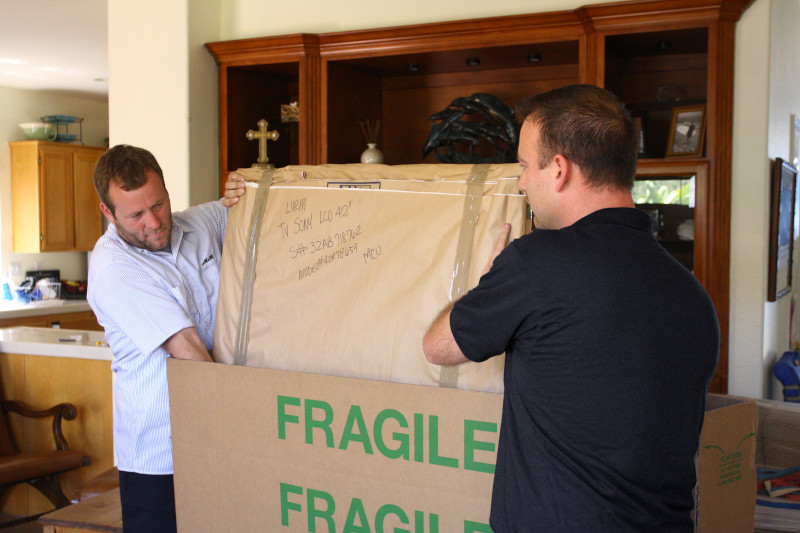What is the Cost of a Long-Distance Move?
While the cost between a long-distance relocation and a local relocation varies, the estimates will as well. They may use one estimate presentation on local and intrastate moves; but be required to use the van line’s estimation format on state-to-state moves.
The estimate should lay out all the charges, how the final charges will be calculated and how the charges are to be paid and when. The Federal Motor Carrier Safety Administration (FMCSA) also requires that long distance moving companies clearly delineate the cost of any potential services which you are not requesting but could become necessary due to circumstances unknown to you and the interstate household goods carrier at the time the estimate was produced. (Delivery to self-storage, use of a shuttle van, a request to deliver the goods into carrier provided storage, waiting time if you are late, etc.)

A copy of the survey should accompany the cost of any interstate moving estimate(s) you receive. The survey very specifically declares what items are being including in the pricing agreement. If you have questions about any of the sections of the survey or any of the acronyms used, ask the surveyor. Asking questions prior to the loading process is always preferable to finding out on the loading day(s) that something crucial was missed.
Additionally, the sales person should provide you with the Guide to a Good Move, High Value Inventory as well as Your Rights and Responsibilities When You Move. The Federal Motor Carrier Safety Administration oversees long distance moves between different states and REQUIRES moving companies to provide this literature alongside any interstate estimate they provide. https://www.fmcsa.dot.gov/protect-your-move/consumer-rights
Long Distance Moving vs. Local Moving
The earliest differentiation you will come across in hiring a long-distance moving company versus a local moving company is the cost. Interstate moves are typically far more expensive then local or intrastate moves. You will also typically be dealing with different “operating authority” than you would be on a local or intrastate move. This is because the long-distance moving component of a relocation company is federally regulated by the Federal Motor Carrier Safety Administration as your shipment will cross state lines.
Most local moving companies have their own operating authority within the state in which they are registered and located. A long-distance moving company will usually have its interstate operating authority through a state-to-state van line for whom they act as an agent. The van line typically establishes pricing guidelines and moderates how much tonnage is booked on a certain day to avoid any service failures, as well as establishing the qualification process for the van foreman who will haul long distance interstate household goods shipments.
Currently the cost to load, transport and deliver a long distance, interstate move is typically between $1.50 to $2.50 per pound depending upon the size of the shipment, the load date and the van line that is pricing it. This strictly covers loading, transporting and delivering shipments.
This can also vary based on whether you are moving under a preferred customer agreement or relocation package through your employer. This does not include having the mover pack everything into cartons and the total mileage your shipment travels can impact the cost per pound.
Moving across state lines varies from moving from ward to ward
Moving is stressful but understanding the scope of your move and how your destination affects the intricacies of it is crucial. To consider why the two would be vastly different, just consider the difference between moving locally within 8 miles and moving a long distance such as 800 miles. You can quickly start seeing some of the different challenges.
Inventory of Your Items Before Moving Day!

Whether you have a packing crew coming to box everything up or whether it is the loading crew, make sure you disconnect and unplug all of your electronics and separate the cords. If you have opted to dismount your own flat screen TVs, make sure they are disconnected and down prior to the crew’s arrival. Have the walkways within your home and to and from the street clear of any boxes or household goods items.
Prior to loading an interstate shipment, a crew member will perform an inventory of the items to be loaded. As the homeowner, you should be available in case they need to confirm items to be loaded or want to review any pre-existing damage they are entering onto the inventory sheet.
During this inventory, the person performing the inventory has the right to see, inspect and re-pack any items you have included on the High Value Inventory. This serves the purpose of confirming they are in the shipment (protects you) and allows the carrier to insure they are packed properly (protects the carrier.)
You can help expedite this process by pulling items out of obscured storage areas, crawlspaces and attics that don’t have fixed stairs. You know your residence and the areas which may be missed by the crew because they are out of plain view. The more items you can put in plain view of the crew, the better the odds that nothing will be missed during the loading process. This excludes built in closets and cabinets that have doors that are readily apparent to the crew.
All carriers recommend not shipping irreplaceable items. Items such as stamp collections, stock certificates, birth certificates, family photos and heirlooms cannot be replaced.
What if we didn’t pack everything for moving day?
During the process communication with your relocation consultant is key. If you said you would pack everything but now realized you have bitten off more than you can chew, call them as soon as you have made this realization. Not doing so can put an undue burden on the crew and potentially negatively impact the quality of your move.
What if our closing date changed, can we change our move date?
If you thought you had your closing date all locked up and are now realizing it may fall through or be pushed back several weeks this needs communicated to your relocation consultant. It’s time to talk potential storage options and re-visit your service dates.
Do you move gym equipment?
If you said you would move your own gym equipment…but haven’t, call your relocation consultant. The sooner the better, because third party services book well in advance just like long distance moving companies do. Failure to do so could potentially lead to the driver not being able to load these items.
Can you move a grand piano long distance?
Did you tell the relocation consultant the grand piano was staying behind for your niece? If that has changed and it’s being shipped call your relocation consultant immediately if you need a our professionals for moving a grand piano, as they may now require an additional helper more than they had planned.
Can things stay in the drawers when moving?
If they are pull out drawers you can leave linens, cloths, blankets, towels, pillows, etc in them. All other contents need to be emptied and desk drawers should be emptied. Ask your mover what their expectations are regarding file cabinet drawers.
